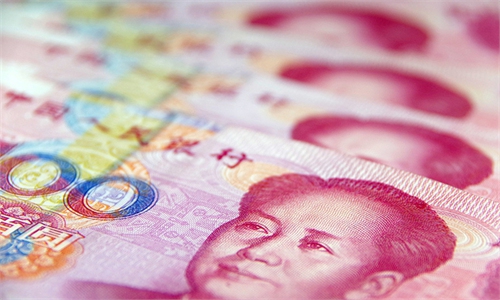
Illustration: Tang Tengfei/Global Times
India has asked banks and traders to avoid using the Chinese yuan to pay for Russian imports based on political consideration, Reuters reported on Monday, citing sources in New Delhi. Indian officials did not say whether there were also economic reasons behind India's reluctance to accept yuan settlement, according to the report.As New Delhi has long seen China as both geopolitical competitor and cooperation partner, it is not surprising to see reports that India remains wary of yuan settlement. Nevertheless, it's also indisputable fact that, in economic perspective, the yuan is increasingly becoming a rational option for developing countries like India to effectively control risks in current international environment under impacts of geopolitical conflicts and Western countries' irresponsible macroeconomic policies.
If the report is confirmed to be true, and India reduces yuan settlement in foreign trade out of political considerations, this is clearly not conducive to securing stability of its economy and currency in current global economic landscape. More importantly, yuan's popularity will not be impacted even if India cuts yuan settlement. Avoiding yuan settlement in foreign trade will only increase India's exposure to economic risks and cause loss to its economy.
While the US has been gathering its allies to launch unprecedented sanctions against Russia since the Russia-Ukraine conflict, India has refused to take sides despite US pressure and emerged as a top buyer of Russian oil as well as discounted coal. To reduce risks associated with Western sanctions on Russia, India naturally expanded settlement of more Asian currencies including the yuan, which has effectively helped India endure external impacts.
Indeed, a general trend has been formed: more developing countries like India are diversifying settlement currencies rather than only using the US dollar. This is conducive to yuan settlement to gain popularity and yuan internationalization to make progress.
Of course, whether it is India or any other country, when choosing which currency to settle foreign trade, it is the result of comprehensive consideration of economic factors and geopolitical factors. But even if geopolitical factors will still exist for a long time, the steady progress in yuan internationalization will not be affected.
Currently, opportunities for yuan internationalization still outweigh the challenges. The rising international status of China's currency is underpinned by the world's second largest economy's strengthening economic power and influence. As the top trading partner of more than 120 countries around the world and the global manufacturing hub, the Chinese economy supports the yuan as it wins recognition of more countries across the world.
According to the Yuan Internationalization Report 2022 released by the People's Bank of China in November 2022, since 2021, cross-border yuan settlement has continued to grow from an already high base in the prior year. In 2021, the total amount of cross-border yuan settlement by banks on behalf of their customers was yuan 36.61 trillion yuan ($5.33 trillion), a year-on-year increase of 29 percent, reaching a record high in terms of value.
Looking back at the exchange rate fluctuation of the currencies and trade performance of various countries since the outbreak of the COVID-19, the continuous internationalization of the yuan has played a positive role in helping more developing countries maintain financial stability and guard national economic security.
Take India. In the face of the impacts of the COVID-19 and the strong dollar driven by the US Federal Reserve's interest rate hike, Indian currency dealers said that yuan is increasingly becoming the key gauge to determine the movement in rupee-dollar exchange rate. This has helped India keep the exchange rate relatively stable when the currencies of many Asian countries depreciated under the impact of a strong US dollar.
Moreover, for India, expanding yuan settlement in trade will help it save more US dollar reserves to prepare for potential financial shocks. As the cost of purchasing Chinese goods in yuan will be lower, it also helps India tame inflation, which is beneficial for its currency and economy.
The internationalization of the yuan will be a long process, and it will face challenges brought about by geopolitical factors, but it should be pointed out that this process will not stop or go backwards. As China's economy is steadily promoting high-quality transformation and continuous growth, yuan internationalization will surely make continuous and steady progress.
The author is a reporter with the Global Times. bizopinion@globaltimes.com.cn



